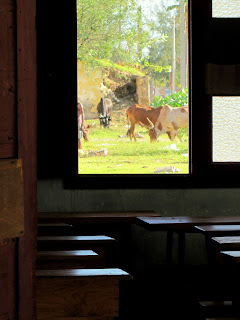 A superorganism is, simply, a larger organism - itself made of smaller organisms working towards a common good. Bees in a bee hive are a classic example of such phenomena. When groups become so well coordinated and integrated so as to function as a singular unit, so the metaphor goes - they become a superorganism. Alas - I am not looking for bees either... the endemic species of superorganism I am searching for is located only in very specific environments: the University Cities of Madagascar!
A superorganism is, simply, a larger organism - itself made of smaller organisms working towards a common good. Bees in a bee hive are a classic example of such phenomena. When groups become so well coordinated and integrated so as to function as a singular unit, so the metaphor goes - they become a superorganism. Alas - I am not looking for bees either... the endemic species of superorganism I am searching for is located only in very specific environments: the University Cities of Madagascar!My lab at the University of Toliara has completed it's first year of experimental programming, and we now prepare for 2014 and beyond, focusing on our primary objective: the mapping and cultivating of the University-Assisted Community School (UACS) model in each of the six Malagasy cities housing one of the National University System campuses.
The UACS model, developed extensively by the Netter Center at University of Pennsylvania, supports strong partnerships between university students and regional schools. What's more, such partnerships work towards the aims of highly effective Community School models (in which schools and communities work collaboratively towards widespread benefit).
Now, if my international team of undergrads through PhD candidates is able to both find and cultivate strong partnerships between Malagasy universities, regional school systems, and local communities; how will we know if we are looking at a real superorganism?
Is a UACS model iteself a superorganism, or is it an ecosystem of superorganisms?
OR - is it just an ecosystem of human organisms??
 I earlier described superorganisms as both a metaphor and a reality - and that is the exact point of exploration for the programming that lies ahead.
I earlier described superorganisms as both a metaphor and a reality - and that is the exact point of exploration for the programming that lies ahead.As our lab works toward the critical aim of cultivating UACS models in Madagascar, we will be guided by a top pick of global curriculum to aid us in developing scientific perspectives on the nature and narrative of the school as superorganism.
Pictured above is our (very fledgling) collection of resources. A sort of UACS incubator in a suitcase if you will. Through generous private donations, this year I bring a panoply of resources ranging from Tablets (3) and a Laptop (1), to a portable EEG headset* (1), and most critically - the absolute best in both science and civics curriculum from around the world!
Our three specific curriculum resources:
- The Big History Project
- 13.7 billion years of history and more - on one little DVD-ROM!
- This incredible resource brings an internationally benchmarked curricular foundation to Malagasy schools, and one that integrates the physical, biological, and social sciences in a comprehensible and awe-inspiring way!
- It is within this context of Big History that students are given lenses through which to view their community as a nested complex of organs, organisms, and super-organisms in both metaphoric and scientific terms.
- Project Citizen (Malagasy Edition)
- A service-learning project in which university students work with high school students to analyze public policy and advocate for positive community development.
- This is the work-horse of our applied learning opportunities and provides tangible benefits for students, schools, and the broader community!
- As students begin to search their own community for signs of the UACS superorganism, we will use the lauded Project Citizen framework to examine potential policy development opportunities.
- TED-ED
- DVD's loaded with topical TED Talks on issues of Education, Community Development, Urban Studies, Digital Democracy, and much, much more!
- All videos are offered with both french and english sub-titles. This promises to transform our previously struggling English Language Learning Center!
Our information technology resources are slim to say the least - the only way to proceed in such a harsh environment is to capitalize on social capital - bonding and bridging our way to a system of superorganismic significance. That is to say.... using the UACS model, we can now deploy our more than capable University of Toliara Teachers-in-Training into our regional K-12 school partners with the absolute leading-edge of curriculum in hand and mind.
As the high school and university students of Toliara work together to map and cultivate a healthy UACS superorganism locally, they are really cultivating a healthy future for their city and university cities, globally. There is something about studying the big history of brains, schools, and society all together and all at once - which catalyzes the growth of this exciting prospect. I hope you'll join us over the year on our expedition in search of the superorganisms of urban Madagascar!
*For those wondering how we can use an EEG headset (a measurement tool for brainwaves), our educational psychology students have a special interest in neuropsychology, and this entry level tool, combined with our curricular resources will give them access to new horizons of understanding the effects of, for example, fear, stress and play in student learning and life success.











